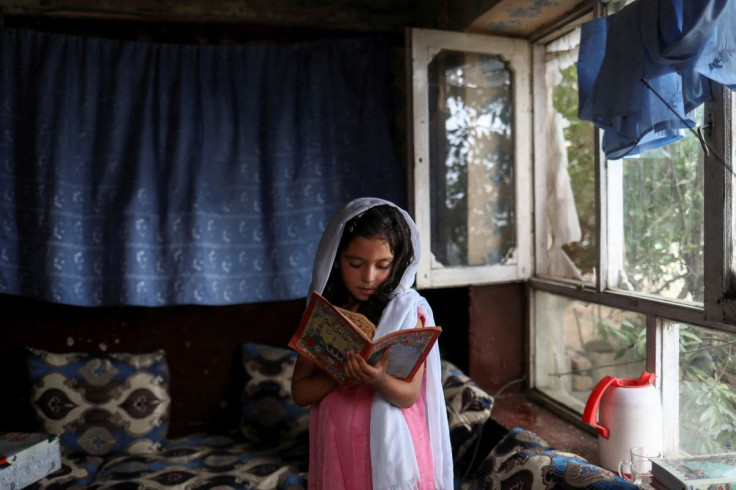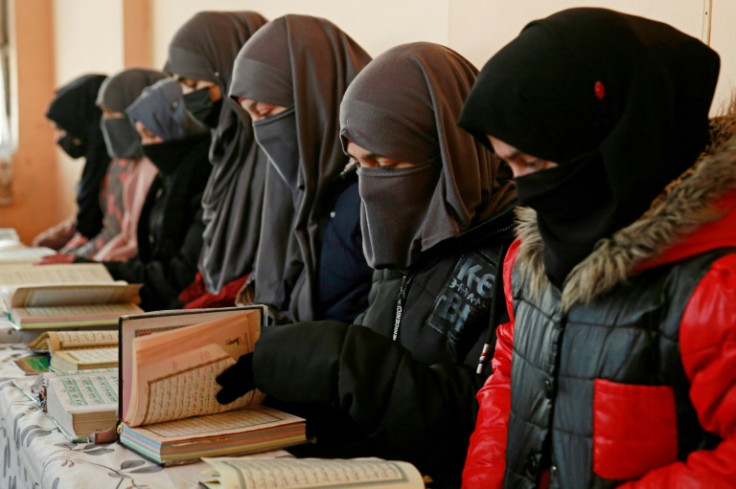Taliban Members Secretly Send Daughters To School Amid Supreme Leader's Ban: Report

KEY POINTS
- Some Taliban members reportedly send their daughters to secret Afghan schools or abroad to study
- Some high-ranking Taliban officials hinted at their disapproval of the ban on secondary education for Afghan women and girls
- Secret schools were established across Afghanistan to teach girls
Some Taliban members secretly send their daughters to underground schools in Afghanistan or to foreign schools to continue their studies after the Taliban's supreme leader reinstated the group's signature policy prohibiting Afghan women and girls from attending high school, according to a new report.
Mullah Haibatullah Akhundzada revived the ban from the '90s after the Taliban returned to power in Afghanistan in 2021, more than two decades after their ouster by a United States-led military coalition. The controversial move makes it the only country that bars girls from getting a secondary education.
However, the Wall Street Journal reported that a number of families, including "a small minority of the Taliban," are sending their daughters and other female relatives to secret schools, often in houses, in Afghanistan or to countries such as Pakistan to study.
Some high-ranking Taliban officials have hinted at their opposition to the ban on
girls' education in speeches, saying that they don't want to be harsh on Afghan people, despite the hardships faced by women amid their grip on power.
"If yesterday we were harsh against the enemy, today we are soft towards our people," Taliban's Interior Minister Sirajuddin Haqqani said in a speech in February. "It is not our aim to be a dictator and rule the people in such a way that they suffer under us."
Taliban Defense Minister Mullah Yaqoob Mujahid, the son of the group's founder Mullah
Mohammad Omar, appeared to echo Haqqani's sentiments in the same month.
"We should always listen to the legitimate demands of the people," Mujahid said.
Taliban Justice Minister Abdul Hakim Sharayi, a close ally of the group's supreme leader, confirmed that the government's cabinet of ministers did not agree with suspending girls' education. Sharayi said some Taliban officials preferred gradual changes to Afghanistan's education system.
However, Sharayi said that the ban was needed because of the U.S.' "ideological invasion," claiming that the Americans attempted to change their culture and "morally
destroy" their society.
Taliban ministers have traveled multiple times to Kandahar to privately urge their leader to reverse the policy banning girls from receiving secondary education, some officials and foreign ministers familiar with the matter told WSJ.
On the ground, many underground schools have been put up across the country to help Afghan girls continue their studies and evade being prosecuted by the Taliban, the outlet reported.
One such school is being hosted in a two-room house in Afghanistan's capital Kabul. One of the 40 girls getting secondary education there, 13-year-old Yalda, told WSJ in English that she attends the underground school because of her dream of becoming an engineer. However, Yalda expressed her sadness that she could not decide on her own future because of the ban.
In northern Afghanistan, residents there connived with local Taliban officials to keep girls' high schools open, according to the report.
A 25-year-old Afghan woman told the publication that the Taliban's intelligence service took no action when they visited one of her secret schools.
Meanwhile, Radio Begum, a Kabul-based radio station, has changed its programming to accommodate Afghan girls who want to learn by including six hours of school classes daily. The Afghan radio station also trained teachers to make their voices more compelling and brought a few girls into their studio to participate in the production and respond to the teachers.
Some Afghan teachers resorted to online teaching to accommodate girls who have internet access.
Homeira Qadiri, an Afghan teacher of an online class, said the students are being provided with PDF files of some popular books, including George Orwell's "1984" and Margaret Atwood's "The Handmaid's Tale."
Despite this, Qadiri said educating students in physical schools remains the best approach.
Data from the United Nations Educational, Scientific and Cultural Organization (UNESCO) revealed that 80% of school-aged Afghan girls and young women – 2.5 million people – remain out of school due to the Taliban's education policy.
In December, the Taliban expanded the ban to the college level, affecting 100,000 Afghan female students attending government and private higher education institutions.

© Copyright IBTimes 2024. All rights reserved.






















